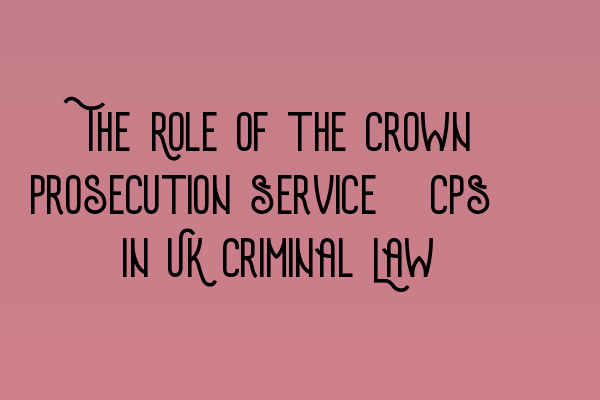The Role of the Crown Prosecution Service (CPS) in UK Criminal Law
The Crown Prosecution Service (CPS) plays a crucial role in the criminal justice system of the United Kingdom. As a solicitor at SQE Criminal Law & Practice Law UK, I often come across cases where the CPS is pivotal in ensuring fair and effective prosecution.
Established in 1985, the CPS is an independent prosecuting authority that operates under the direction of the Attorney General. Its primary responsibility is to handle the prosecution of criminal cases investigated by the police in England and Wales. The CPS works closely with the police, gathering evidence, undertaking legal analysis, and making decisions on whether to charge suspects.
One of the key functions of the CPS is to review and assess the evidence presented by the police. This involves conducting a thorough examination of the circumstances surrounding the alleged crime, evaluating witness statements, examining forensic evidence, and assessing the strength of the case. The CPS operates under a two-stage test: the evidential stage and the public interest stage.
The Evidential Stage
During the evidential stage, the CPS determines whether there is sufficient evidence to provide a realistic prospect of conviction. This means assessing the quality and admissibility of the evidence. Factors such as witness credibility, reliability of forensic evidence, and the overall strength of the case are carefully considered. If the evidence is deemed insufficient, the CPS may decide not to proceed with the prosecution.
However, if the evidence meets the required standard, the CPS moves on to the public interest stage.
The Public Interest Stage
At the public interest stage, the CPS considers whether it is in the public interest to prosecute. This involves weighing the seriousness of the offense, the harm caused to the victim, the defendant’s culpability, and any potential mitigating factors. The CPS also takes into account the impact of the prosecution on the community and the likelihood of achieving a successful conviction.
It is important to note that the CPS is guided by the Code for Crown Prosecutors, which sets out the principles to be followed when making prosecution decisions. The Code promotes fairness, transparency, and consistency in decision-making.
Once the CPS decides to proceed with a prosecution, it takes charge of presenting the case in court. CPS lawyers, known as Crown Prosecutors, work closely with the police in preparing and presenting the evidence. They are responsible for drafting charges, conducting legal research, advising on case strategy, and presenting the case to the court.
The CPS also plays a crucial role in providing support to victims and witnesses throughout the prosecution process. It ensures that they are kept informed about the progress of the case, provides guidance on court procedures, and arranges special measures to facilitate their participation in the proceedings.
In conclusion, the Crown Prosecution Service (CPS) is an integral component of the criminal justice system in the UK. As solicitors, we rely on the expertise and diligence of the CPS to ensure that justice is delivered effectively and efficiently. If you are interested in learning more about the legal profession, I encourage you to check out our related articles:
- SQE 1 Practice Exam Questions
- SQE 1 Practice Mocks FLK1 FLK2
- SQE 2 Preparation Courses
- SQE 1 Preparation Courses
- SRA SQE Exam Dates
Feel free to explore these articles to further expand your knowledge and understanding of the legal profession. If you have any questions or require legal assistance, please do not hesitate to contact us at SQE Criminal Law & Practice Law UK.
